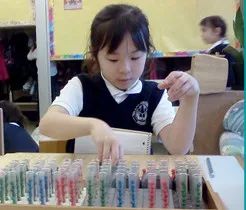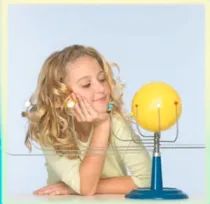
Many people are under the impression that Montessori schools are only for preschool-aged children. While it is true that the very first Montessori school, Casa dei Bambini, was established for children under the age of seven, Dr. Maria Montessori continued throughout her life to develop her teaching method for children of all ages.
One of Dr. Montessori’s many profound discoveries was what she called “planes of development.” Montessori observed that all children experience six-year planes, or cycles of growth, during which the child’s development accelerates dramatically for three years and then enters a calmer three-year period of elaboration. Each of these planes has its own developmental goals, its own unique characteristics, and its own sensitive periods.
Montessori called the first plane, from birth to age six, the “absorbent mind” stage. Children in this stage “soak up” information like a sponge soaks up water: spontaneously and without conscious effort. To learn more about the absorbent mind stage, check out any of the resources below:
The Reasoning Mind
After age six, children pass into the “reasoning mind” stage of development, which lasts from about age six to twelve (though we continue to have our reasoning mind throughout the rest of our lives.) During this stage, learning takes place very differently. Children are less drawn to mimicry and repetition, and are more inclined toward abstract thinking.
 Children at this age are also developing important social skills.
Children at this age are also developing important social skills.

Children at this age are also developing important social skills. Thus, they are far more interested in engaging with others in their environment. These children are making the transition from working (and playing) alongside peers to working with them cooperatively.
They also show interest in their extended community and have an ever-broadening sense of social awareness. Montessori elementary programs include a wide range of opportunities for children to explore this social awareness through the study of various cultures, language, history, geography, and science.
Moral Exploration
 Montessori elementary programs include a wide range of opportunities for children to explore this social awareness through the study of various cultures, language, history, geography, and science.
Montessori elementary programs include a wide range of opportunities for children to explore this social awareness through the study of various cultures, language, history, geography, and science.
Children at this age are also particularly interested in moral exploration. They are developing a sense of right and wrong, justice, and fairness. It is especially important to role model strong values for children at this age.
During this developmental period, children need to hear stories of kindness, honesty, courage, and honor, to name a few. They need to be shown respect, love, and understanding from the most influential adults in their lives.
Imagination
 The elementary child will seek knowledge of science, history, geography as these subjects apply to the world, and indeed the universe around them.
The elementary child will seek knowledge of science, history, geography as these subjects apply to the world, and indeed the universe around them.

The elementary school years are also the greatest developmental years for the child’s imagination. The child, who previously had to experience concepts through his or her senses, can now imagine ideas without physically experiencing them. Compelled by his growing imagination, the elementary child will seek knowledge of science, history, geography as these subjects apply to the world, and indeed the universe around them. The Montessori elementary curriculum takes advantage of this imaginative age and was created with all of this in mind.
Human consciousness comes into the world as a flaming ball of imagination. Everything invented by man, physical or mental, is the fruit of someone’s imagination. In the study of history and geography we are helpless without imagination, and when we propose to introduce the universe to the child, what but imagination can be of use to us? he secret of good teaching is to regard the child’s intelligence as a fertile field in which seeds may be sown, to grow under the heat of flaming imagination. Our aim therefore is not merely to make the child understand, and still less to force him to memorize, but so to touch his imagination as to enthuse him to his inmost core. ~Maria Montessori
If you would like to learn more about Montessori for Elementary Age Children, we invite you to watch Age of Montessori’s free webinar entitled The Heart of Montessori Elementary Education Webinar.
And, don’t miss your opportunity to enroll in our next Montessori Elementary Teacher Training Program, a rich, interactive online course designed so that students can work on the program in the convenience of their homes as they go about their daily lives, as well as participate in Residencies with Master Teachers. Or enroll as an auditing (non-credit) student for just the online component.
Explore the Montessori Elementary Teacher Certification which is both online and in-person.
Call today for your personal consultation (406) 284-2160.





















